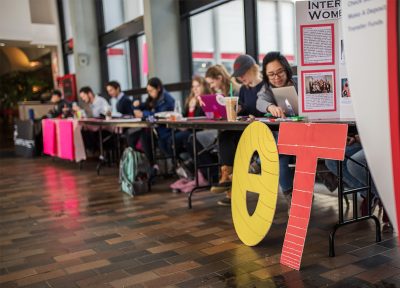
Ten months after Allocations Board instated a new system of allocating funds to clubs on campus, Madison Cannon, assistant director of student organizations, said the university is still working on transitioning to this new system.
The new system, known as the Square, “allows each group to receive the best support and resources for success,” according to the Student Activities Office’s website. The program is divided up into four “roads” — or groups — for Boston University’s undergraduate student organizations.
“Each road includes unique benefits, support and expectations based upon the style of programming and events offered by student groups,” according to the website. The four roads are Bay State, Beacon, Commonwealth and Brookline.
“In terms of gauging its effectiveness as a program for recognizing student groups and their training thus far and what resources are available to them, I would say that we’re still working through that process,” Cannon said.
Cannon added that SAO is also looking at possibly changing some things within the Square.
“I would say that we’re definitely on the right track,” she said. “I think that there will likely be some small tweaks that we’ll make in the program, really taking better advantage of the resources that we have with different campus partners.”
As far as funding, Cannon said “that doesn’t necessary have a whole lot to do with the Square specifically.”
She said the Square also looks to put out an annual report at the end of the semester or during the summer to compare funding for groups to previous years, as well as semester-to-semester.
Student groups on campus have had a myriad of reactions, as some groups were affected more by the new system than others and had a harder time to adapt.
President of the BU Outing Club, Julia Molinaro, a senior in the Questrom School of Business, said her group was affected negatively.
“The new system of funding affects Outing Club negatively, because the nature of our club is one that relies on university funding for expensive items, such as gear and trip subsidies,” Molinaro said.
In the past, the Outing Club received funding from SAO’s Allocations Board to buy outdoor gear for the club and for certain trips.
Molinaro said the group has had to make accommodations for the change in funding policy by looking elsewhere for support, such as from other student groups on campus.
“The revised guidelines may be beneficial for clubs that are on campus and have a few events per year, but [they do] not tailor to clubs like ours that run weekly trips outside of the BU campus. We feel excluded from BU funding opportunities because BUOC does not fall into the cookie cutter of a typical BU club.”
Student groups such as Stage Troupe, a student-run theatre group on campus, and the International Affairs Association, haven’t had as much difficulty adjusting to the new system.
Stage Troupe treasurer Andrew Moeller, a junior in the School of Education and the College of Arts and Sciences, said one problem the group has seen is not knowing in advance how much funding the group will get from AB.
“In the past, what we’ve done is the Allocation Board’s system, [which] was a rolling process and had like one meeting every month where they would allocate funds,” Moeller said. “So it would be a lot easier for us to be able to get funds.”
Stage Troupe is a “Commonwealth Group,” which means that the troupe provides a lot of its own funding already.
“It’s just a lot harder for us to get a specified Allocations Board funding,” Moeller said.
However, Moeller said it’s made him, as the treasurer, “get better at financially planning this semester.”
Shivansh Chaturvedi, treasurer of the International Affairs Association and a sophomore in Questrom and CAS, said that while her group receives an adequate amount of funding from AB, she said the new system is a bit unfair.
“I believe that AB should reinstate funding travel and accommodation[s], as those tend to be some of the largest expenditures for student groups,” Chaturvedi said.
But Chaturvedi does believe that the Square is a good idea overall.
“After all, not all student groups are equal in size and programming, and thus need tailored attention, which I think the Square gives them,” Chaturvedi said.
Katherine Cornetta, assistant to the Dean of Students, said that funding of extracurricular activities is very important to her office.
“Funding them is really important to us and that’s something that Dean [of Students Kenneth] Elmore always makes very clear to all of the departments that report up to him,” Cornetta said.
Cornetta also said the Dean of Students’ Office does their part to give input to SAO on student organizations. John Battaglino, assistant dean of students and executive director of student activities, is the liaison between the two offices.
“Dean Elmore gives what he’d like to see … and then Dean Battaglino takes that and brings it to student activities and they decide how to implement it,” Cornetta said.


















































































































